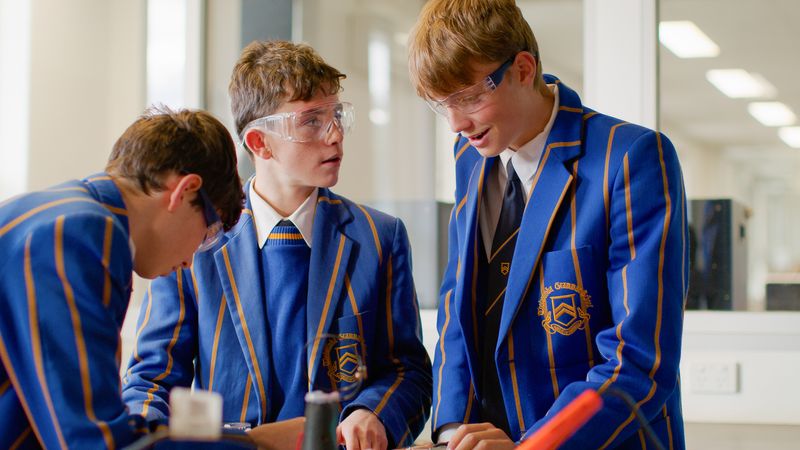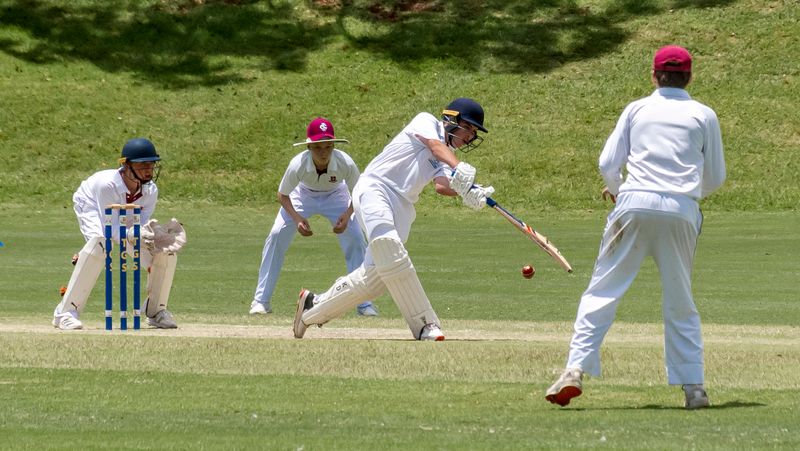“Many of the respondents spoke of controlling the controllables across six broad themes: Consistency and Routine, Using Study Tools, Environment Control, Intrinsic Motivation, Resilience and Perspective.”Mrs Crystal Hede, Director of Learning and Innovation

Giving students the opportunity to cope with disappointment has the capacity to shape their good character.
Schools are inherently hopeful and happy places. Their natural focus on growth, connectedness and preparing youth for a better future creates an optimistic atmosphere in which ambitions are born. These positive emotions and experiences lay the foundation for our expectations and while these can be highly motivating, they come with a catch: the greater our expectations, the greater the disappointments, too.
Disappointment is not a popular feeling. Rightly so, not many of us wish to feel sad, displeased or frustrated by the non-fulfilment of our hopes or expectations. However, in an academic setting, disappointments are inevitable and they can manifest in various forms. Commonly, students can find it hard to understand a concept that they see their peers comprehending and receive a lower-than-desired assessment result. Even worse, they can feel “robbed” of a grade that they believed to be rightfully theirs, not be with their preferred teacher, fall short of the required points for an academic award and face unexpected obstacles that disrupt their learning. Invariably, students will experience one or more of these things at some point in their schooling, possibly all of them, often.

For parents, it can be incredibly difficult to watch our children experience these things, especially when they result in further negative emotions such as shame or self-loathing. Sometimes, the worry we feel for our children is almost unbearable and it is natural to want to fix the problem for them. Prominent clinical psychologist, Dr Judith Locke is a leading voice on this topic. In her article, Kids need to fail. And parents need to let them; she says, “When your child is disappointed, it’s understandable you want them to feel better immediately, but taking temporary bad feelings away makes your child less capable to face inevitable trickiness in the future.” Locke goes on to say, “While I know it feels awful to watch your child be disappointed or sad, every time you help them avoid those feelings, you also sidestep them learning essential skills of resilience and a belief they will cope if life doesn’t always go their way.”

For these reasons, we will not shield students from experiencing disappointment at TGS. Doing so would be detrimental to their development and this fails to prepare them for the realities of life. Most importantly, giving students the opportunity to cope with disappointment has the capacity to shape their good character. As beautifully put by Irish politician Sir Boyle Roche, “Disappointment is the nurse of wisdom.”
I sought the wisdom of some of our older TGS students who have learned to manage their disappointments over time and even harness them for good. Specifically, I surveyed recipients of diligence awards because these recognise dedication and resilience rather than grades. All the respondents admitted to encountering setbacks and shared various versions of not letting these deter their efforts. One of the seniors said, “When faced with disappointment, I use ‘failure’ as a motivator to strive for improvement and apply the feedback I receive to make adjustments for the future.”
- Consistency and Routine: Diligent students emphasised the importance of sticking to a structured study schedule. They often study at the same time every day and for consistent durations to build a habit of regular learning.
- Using Study Tools: Many of these students use study trackers, whiteboards and diaries to reinforce learning and ensure they systematically cover all necessary material.
- Environment Control: They create and maintain separate spaces for study and relaxation to condition their minds for productive work when in the study zone. This includes removing any electronic devices from the study area.
- Intrinsic Motivation: Consistently, the diligent students spoke of a strong internal drive to improve and put in the effort required to overcome academic hurdles. This includes proactively seeking clarification or help.
- Resilience: Their responses demonstrated resilience in the form of a “bounce back” mentality. They spoke of accepting that not all decisions will be to their liking (for example, class allocations), acknowledging their negative emotions and then moving on in order to stay focused on their learning.
- Perspective: Maturely, some of the boys spoke about managing their expectations. While hopes and dreams can be powerful motivators, it’s important to balance them with realistic expectations to maintain a healthy mindset.
TGS Old Boy (2011-13) and 2024 Paris Olympic medalist, Matthew Denny recently spoke with our students, sharing some anecdotes and advice that aligned with the above sentiments. He said that one of the biggest things he learned from his career was that “Success lies on the other side of discomfort. You just need to step toward it and keep moving.” Matthew’s wise words support the notion that disappointment — a form of discomfort — is a natural and expected part of life that forms our character as we strive towards our goals and aspirations. With this in mind, our TGS boys need to keep dreaming but expect that disappointment will occur. They need to keep moving and trying and see disappointment as an opportunity for learning.
Reference
Locke, J. (2019, March). Kids need to fail. And parents need to let them. The Courier Mail. Retrieved September, 2024, from https://www.couriermail.com.au/rendezview/kids-need-to-fail-and-parents-need-to-let-them/news-story/5df007cfd72f50b4a22b03c39c127781
Latest Blog
Outdoor Pursuits and Activities Week - Developing Good Character Beyond the Classroom
We offer a range of enrichment activities for our boys, but the last week of Term 1 is a very special opportunity for all of our Senior School students. It's Outdoor Pursuits and Activities Week, which provides age-appropriate physical challenges in a safe, well-supervised environment. Activities on the various camps may include ropes courses, rock climbing, bodyboarding, surfing, mountain biking and canoeing. The aim is to foster a love of the outdoors and an appreciation of the environment.…
Stories behind key TGS staff helping shape our students
It was my great privilege to join TGS as Head of House - Boyce Boarding in 2024. The opportunity to lead these young men of character on their TGS journey carries great weight but is also enormously exciting. Embarking upon this project alongside my wife Meg as Boyce Boarding House Manager strengthens the team further. I am hopeful that we will demonstrate to the boys how positive relationships can foster a warm and supportive environment. I know that many of our boys are familiar with strong…
More Than Just an Education and That Makes All the Difference
Toowoomba Grammar School excels in its extensive co-curricular programs, particularly in performing arts and sports. Our boys learn that success comes from hard work and dedication. This ethos is inspired by quotes like “You don’t have to be great to start, but you have to start to be great,” “The harder I work, the luckier I get” and the words emblazoned on our P.B. Hauser Aquatic Centre wall “Success is the celebration of preparation.” These opportunities allow students to excel in programs…
Stewardship: Leading the Way in Safety, Sustainability and Security
However, the challenges facing the Director of Facilities, Mr Bengie Dickeson and the Director of Information Technology, Mr Ron Robinson certainly are. This month's weather has been nothing if not unpredictable and it's in those conditions that both these men's skills come to the fore. With Tropical Cyclone Alfred and its threat to our School campus and community - Mr Bengie Dickeson and Mr Ron Robinson played integral roles in keeping everyone and everything on our 150-year-old campus safe.…
Pursuing New Horizons in Horticulture
Jake Moon is a sixth-generation primary producer. He is dedicated to agriculture and is currently working at his family’s St George farming enterprise, tackling some of the sector’s biggest challenges. The 28-year-old says his family moved to the St George irrigation precinct in 1978, initially growing rockmelons and watermelons, hence the business name Moonrocks. Seasonal and market changes led them to switch crops frequently, growing grapes, broccoli and even wax flowers over the years.…
Crushing it at Cricket and Conveying Culture
He explains that he’s named after Yarramundi, a respected and influential leader of the Richmond tribes of the Dharagnora (Hawkesbury-Nepean region of New South Wales) and a respected elder of the Boorooberongal clan of the Dharug people. “I’m proud of my culture and excited to have just started learning Dharug Dalang as part of the language revitalisation with my family.” During one week late last year he juggled exams, balanced representative cricket in Mackay with being the emcee of the…
Disappointment: A Necessary Part of School Life
Schools are inherently hopeful and happy places. Their natural focus on growth, connectedness and preparing youth for a better future creates an optimistic atmosphere in which ambitions are born. These positive emotions and experiences lay the foundation for our expectations and while these can be highly motivating, they come with a catch: the greater our expectations, the greater the disappointments, too. Disappointment is not a popular feeling. Rightly so, not many of us wish to feel sad,…
Boys and Belonging at TGS
As a boarding master of adolescent boys, my role fundamentally concerns pastoral wellbeing and character development to support a successful academic journey. A positive sense of belonging — where boarders feel safe, supported and heard — is fundamental to an effective boarding environment. As such, I felt there was a distinct connection between the International Boys’ Schools Coalition’s (IBSC) theme for the 2024–25 Action Research Cohort, “Boys and Belonging” and what I believe is best…
Fostering Growth and Resilience
This philosophy is vividly demonstrated through our Junior School MATES program, an initiative designed to equip boys from Prep to Year 6 with the skills they need to thrive both in and out of the classroom. Year 6 leader Hugo Seaby epitomises what the program is all about. As a leader in Stephens House, he explains its importance: “It’s about spending time with the younger boys and learning about honesty, respect, kindness and other attributes like that.” He said that it’s helpful for the…